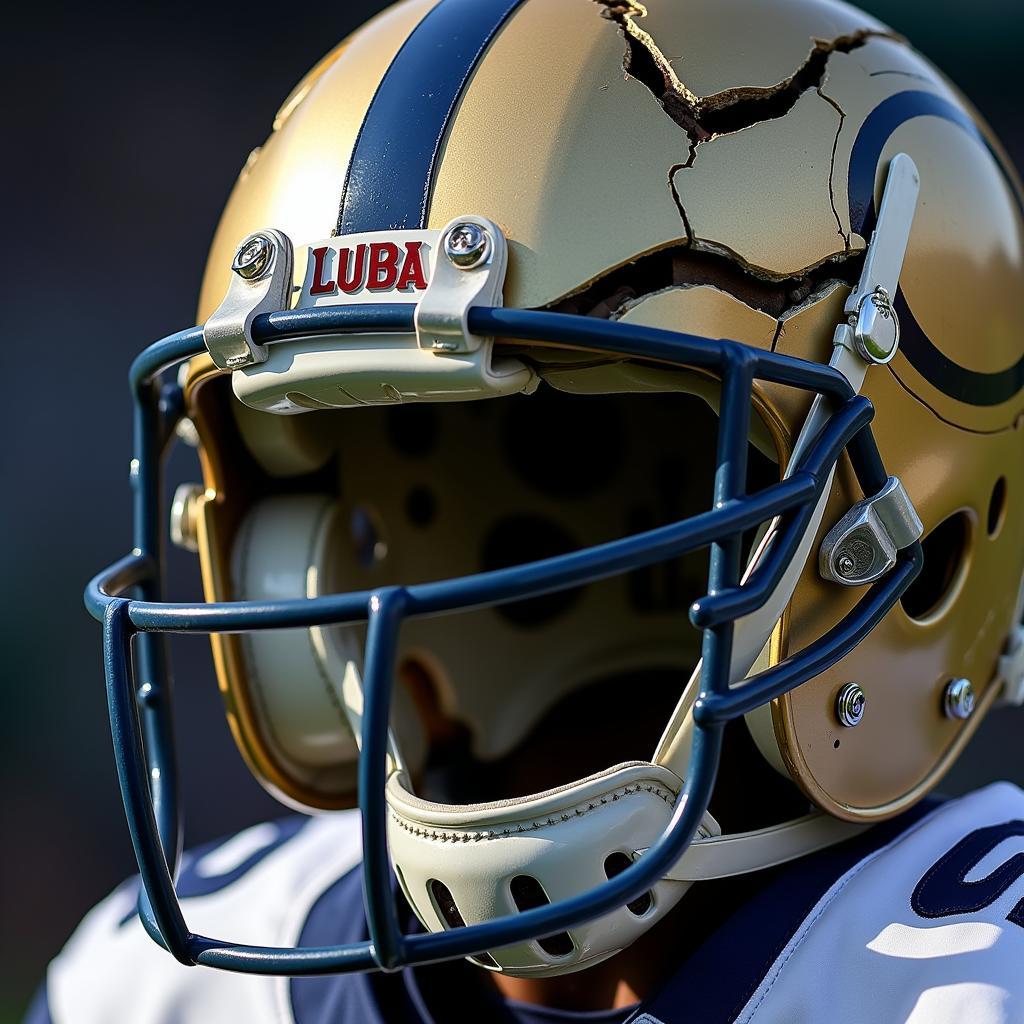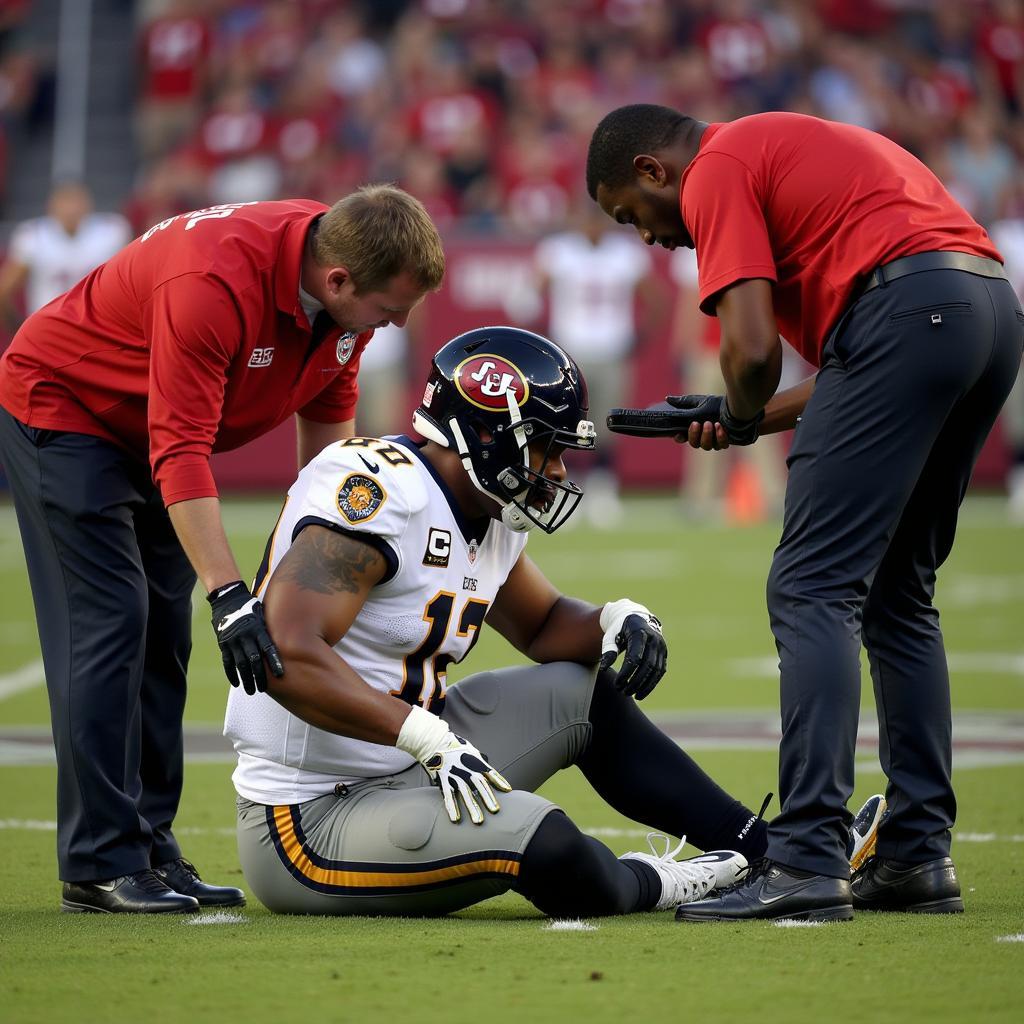Helmet Breaks: Understanding Their Importance in Football
December 7, 2024Helmet Breaks happen. It’s a reality of football, a sport where powerful forces collide. Whether it’s a jarring tackle, a helmet-to-helmet collision, or even a seemingly innocuous fall, helmets can and do break. As a professional footballer, I understand the critical role a helmet plays in protecting players, and witnessing a helmet break is a stark reminder of the inherent risks involved in this beautiful game.  Close-up image of a broken football helmet showing the extent of damage
Close-up image of a broken football helmet showing the extent of damage
What Causes Helmet Breaks?
Helmet breaks aren’t just about the force of impact. While a powerful hit is often the culprit, several factors contribute to a helmet’s structural failure. The age and condition of the helmet are crucial. Just like any piece of equipment, helmets degrade over time. Wear and tear, exposure to the elements, and previous impacts can weaken the material, making it more susceptible to breaking. The type of helmet also matters. Different helmets are designed for different levels of play, and using a helmet not designed for the intensity of the game can increase the risk of breakage.
Another crucial factor is proper fit. A poorly fitting helmet won’t provide optimal protection, even if it’s brand new. If a helmet is too loose, it can shift during impact, reducing its effectiveness and potentially leading to breakage. Conversely, a helmet that’s too tight can create pressure points and discomfort, also compromising its protective capabilities.
Why Are Helmet Breaks So Concerning?
Helmet breaks highlight the potential for serious head injuries. The helmet is the first line of defense against concussions and other head trauma. When it breaks, the player’s head is exposed to the full force of the impact, significantly increasing the risk of injury. Beyond the immediate physical consequences, head injuries can have long-term effects, including cognitive impairment and neurological problems. It’s essential to take helmet breaks seriously and understand the implications for player safety.  A football player is being examined by medical personnel after experiencing a helmet break during a game
A football player is being examined by medical personnel after experiencing a helmet break during a game
How Can We Minimize Helmet Breaks?
Preventing helmet breaks starts with choosing the right helmet. Ensuring the helmet meets the required safety standards and is appropriate for the level of play is paramount. Regular inspection is key. Check for any cracks, dents, or signs of wear and tear. If you find any damage, replace the helmet immediately. Don’t take chances with your safety. Properly fitting the helmet is another critical step. A snug but comfortable fit ensures optimal protection.
Beyond individual responsibility, promoting a culture of safety in football is vital. This includes educating players, coaches, and parents about the importance of helmet safety, enforcing rules against dangerous play, and advocating for stricter safety regulations. kansas baseball camps also emphasize safety.
The Importance of Replacing a Broken Helmet
Once a helmet breaks, it’s essential to replace it immediately. A broken helmet loses its structural integrity and can no longer provide adequate protection. Attempting to repair a broken helmet is not recommended, as it’s unlikely to restore its original protective qualities. batting cages in st petersburg fl emphasize similar safety measures for baseball.
What Should You Do If You Witness a Helmet Break?
If you see a helmet break during a game, immediately stop play and seek medical attention for the player. Even if the player doesn’t show any immediate signs of injury, a medical evaluation is crucial. Concussions and other head injuries can have delayed symptoms. Don’t allow the player to return to the game until a medical professional has cleared them.
“A broken helmet is a non-negotiable removal from the game,” says Dr. Emily Carter, a leading sports medicine physician. “Player safety must always come first.”
Conclusion
Helmet breaks are a serious concern in football. Understanding the causes, consequences, and preventative measures is essential for ensuring player safety. By prioritizing helmet safety, we can protect athletes and promote a safer environment for everyone involved in the game. Remember, replacing a broken helmet isn’t just a precaution; it’s a necessity. achat douze cycle tours
FAQ:
- How often should I replace my football helmet?
- What are the signs of a concussion?
- Are there different types of football helmets?
- What are the safety standards for football helmets?
- How can I ensure my helmet fits properly?
- What should I do if my helmet breaks during practice?
- Where can I get my helmet inspected?
For further information regarding sports safety, you might find our articles on water mister hats and indoor batting cages pittsburgh pa helpful.
Need support? Contact us 24/7 at Phone Number: 0963418788, Email: [email protected] or visit us at 2M4H+PMH, Phường Nghĩa Thành, Gia Nghĩa, Đắk Nông, Việt Nam. We have a dedicated customer service team ready to assist you.